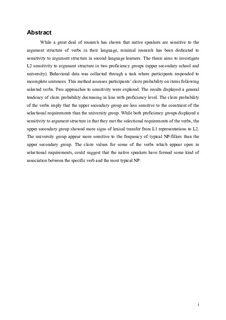Probing sensitivity to argument structure in two proficiency level groups - An exploratory study with Norwegian learners of English
Abstract
While a great deal of research has shown that native speakers are sensitive to the argument structure of verbs in their language, minimal research has been dedicated to sensitivity to argument structure in second language learners. The thesis aims to investigate L2 sensitivity to argument structure in two proficiency groups (upper secondary school and university). Behavioral data was collected through a task where participants responded to incomplete sentences. This method assesses participants’ cloze probability on items following selected verbs. Two approaches to sensitivity were explored. The results displayed a general tendency of cloze probability decreasing in line with proficiency level. The cloze probability of the verbs imply that the upper secondary group are less sensitive to the constraint of the selectional requirements than the university group. While both proficiency groups displayed a sensitivity to argument structure in that they met the selectional requirements of the verbs, the upper secondary group showed more signs of lexical transfer from L1 representations to L2. The university group appear more sensitive to the frequency of typical NP-fillers than the upper secondary group. The cloze values for some of the verbs which appear open in selectional requirements, could suggest that the native speakers have formed some kind of association between the specific verb and the most typical NP.
